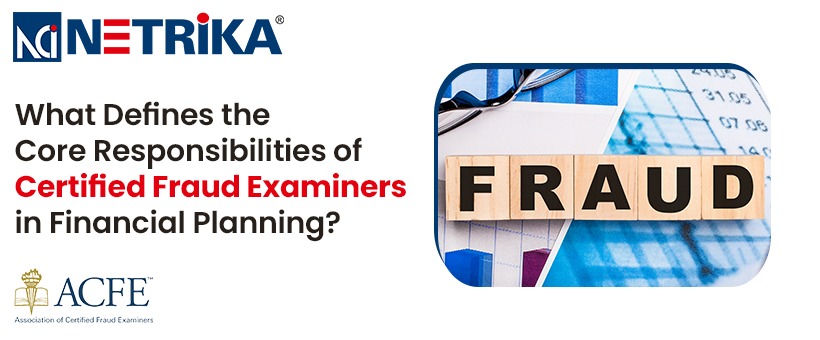What Defines the Core Responsibilities of Certified Fraud Examiners in Financial Planning?
- February 23, 2024
- Posted by: marketing@netrika.com
- Category: Blogs
No Comments

A certified fraud examiner is trained to find evidence of fraud or other financial crimes in financial records as their primary task. They not only detect, investigate, prohibit, and mitigate fraudulent activities, but they also develop preemptive measures to prevent bad actors from penetrating the vulnerable domains of a business.
As the primary role of a professional with ACFE certification lies in the financial vertical, to maintain the integrity of a company in terms of finances and preserve its reputation, they play several crucial responsibilities, including but not limited to
- The financial sector is the most susceptible to fraudulent activities due to the immense gain that a fraudster obtains in terms of money. Certified fraud examiners are trained to recognize such fraudulent cases, identify the type of fraud by leveraging cutting-edge techniques and best practices, and mitigate such acts that can stop financial reporting.
- A professional with ACFE certification can spot red flags and potential fraud indicators through data analysis, forensic accounting, and investigative procedures to help protect financial data, transactions, and processes. This minimizes the risk exposure of fraudulent activities and identifies vulnerable areas, internal controls, or operational processes in a company that need more attention.
- A CFE is completely qualified to recognize and assist auditors in identifying instances of tax evasion, which can prevent the financial sector from suffering huge losses. They are also equipped with identifying one the most complex types of fraud; internet fraud, which works its way up to gain a great deal of access to a person’s or company’s financial, document, and personal information. To drastically lower their capital, internet fraudsters target victims and utilize a range of tactics, including phishing, deep flakes, viruses, and more, to steal transaction data or personal information. A CFE not only spots these types of scams but also teaches staff members how to monitor instances of online deception.
- A certified fraud examiner is trained to design and implement fraud prevention strategies that can proactively mitigate such risks to the financial sector, help streamline the investigation process, and foster a culture of integrity and compliance with regulatory bodies. Professionals with CFE certification also stay abreast with the best practices, relevant laws, industry standards, and guidelines that ensure compliance monitoring and improve the trust of stakeholders in the financial structure.
- Professionals with CFE certification are skilled at collaborating with internal departments, legal counsel, external auditors, and law enforcement agencies during their investigation processes to achieve a more cohesive and comprehensive approach to financial fraud management. This also ensures the organization stays proactive in the event of fraud and is capable of limiting its radius, thus restricting fraud escalation from causing excessive loss.

